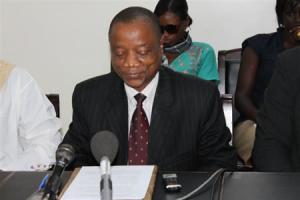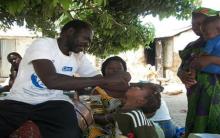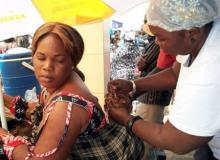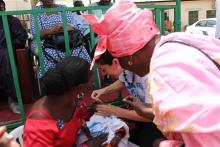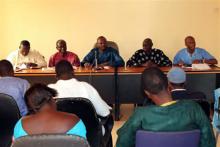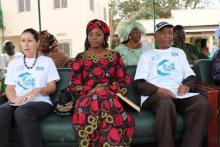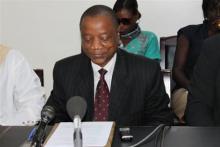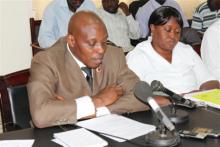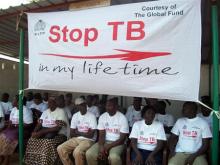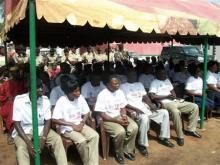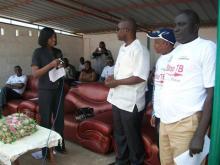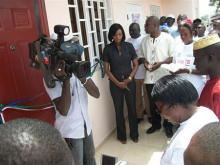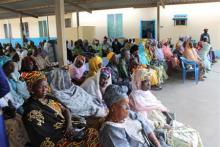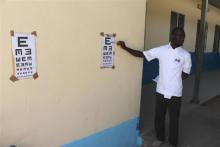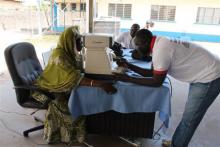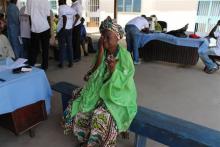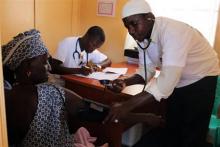Gambia successfully conducts polio NIDs and observes international health days
Banjul, 09 April 2012 -- During the past couple of weeks The Gambia had been actively engaged in a series of international health events – synchronized polio NIDs, World TB Day and World Health Day respectively. The first in the series was the successful conduct of National Immunization Days against polio (NIDs) from 23 to 26 March 2012.
During this four-day campaign, the Gambia achieved a national coverage level of 102%, exceeding the 395,799 children targeted for the exercise, thanks to the strong political commitment and the support of the polio coalition partners and dedicated caregivers and vaccinators from across the country.
This high immunization coverage is a clear indication that Gambians have heeded to the call Honorable Minister of Health and Social Welfare, Fatim Badjie, made at the launch of 2012 NIDs at the Kanifing Municipal Grounds in which she raised concern about the presence of the wild polio virus in the sub-region and that everybody must be on board in support of the polio NIDs.
Therefore, according to the Honorable Minister, The Gambia should not and must not remain complacent in consolidating the fight against polio even though the country was declared polio free in 2004. “Since the wild polio virus is still circulating in the sub-region, the Gambia risks re-introduction of polio, the Minister noted”.
This message was also re-echoed in a joint statement by UNICEF and WHO, which underscored the rationale behind the 2012 synchronized polio NIDs. The statement recognized the achievements made against polio since the global eradication initiative was launched in 1988, but warned against complacency for fear of jeopardizing the huge gains already made.
In conclusion, the two organizations, based on their comparative strengths/advantages, expressed their commitment to supporting the Gambia in eradicating polio. This, according to the statement, will include provision of the much needed technical support, capacity building, strengthening of the surveillance system, provision of vaccines and maintenance of the cold chain systems and heightened social mobilization, to name but a few.
The representative of Rotary International also added her weight to supporting this initiative, noting that her organization has set aside funds to support the Gambia in strengthening social mobilization interventions in support of the polio campaign. The municipal authorities also pledged their support to the initiative, reiterating their commitment to mobilizing the local communities in support of the campaign.
As part of the launch, the Honourable Minister and WHO and UNICEF Representatives were among the dignitaries that administered the first few doses of the polio vaccine marking the beginning of the campaign. Traditional drama groups also entertained the guests/participants with songs and drama on polio. The second activity was the commemoration of World TB Day, which was officially launched on 24 March 2012.
A series of activities was conducted before and after World TB Day as follows:
- Public sensitization on the Gambia Radio and Television Services (GRTS)
- Press briefing hosted by the Ministry of Health and Social Welfare
- Statements by the Honorable Minister of Health and Social Welfare and the WHO Representative on GRTS
- Inauguration of a new TB Clinic/ Laboratory at Mile 2 Central Prisons
That said, this year’s World TB Day was simultaneously observed in all the six health regions of the country.
The first leg of the activities was a panel discussion on GRTS involving the Ministry of Health, WHO and Medical Research Council (MRC) officials, which was meant to sensitize the public on the importance of the Day and what could be done to stop the spread of TB in the Gambia.
At the press briefing hosted by the Ministry of Health and Social Welfare on 22 March, the WHO Representative, Dr Thomas Sukwa, gave an overview of and reiterated WHO’s commitment to the six-pronged “Stop TB Strategy” – pursing high quality DOTS; addressing TB/HIV, MDR-TB; health systems strengthening based on PHC; engaging all care providers; empowering people with TB and promoting TB research.
The MRC also gave a short presentation on the preparations put in place for the proposed national TB prevalence survey to be conducted in the country during the course of the year. It is hoped that this study, the first of its kind in the country, will help establish the true burden of TB in the Gambia.
The National Leprosy/TB Control Programme (NLTP) also used the occasion to highlight some of the achievements the Gambia has made in the prevention and control of TB:
- National TB Porgramme R9 grant has now been rated A2 by the Global Fund for meeting most of its targets;
- There has been an increase in diagnostic and treatment centers from 11 in 2005 to 32 in 2011;
- A further increase in treatment success rate has been achieved from 86% in 2006 to 90% in 2011, surpassing WHO’s target of 85%;
- There has been marked reduction in defaulter rate from 14% in 2005 to 3% in 2010.
The Minister of Health and Social Welfare, Honorable Fatim Badjie, in her opening statement thanked partners like WHO, MRC and the Global Fund for their immense contributions to the successes registered in TB control in the Gambia. She also thanked NLTP for their good work and urged them to work even harder towards the ultimate eradication of TB in the country.
The Honorable Minister also echoed the same message in her televised statement marking the Day in which she emphasized her ministry’s and indeed the Gambia Government’s commitment to TB control.
For his part, the WHO Representative read the statement of the Regional Director, Dr. Luis Gomes Sambo, which recognizes TB as a major public health problem in the African region accounting for over 25% of notified TB cases every year. According to the Regional Director, the TB epidemic in Africa is largely driven by poverty and the negative impact of high TB/HIV co-infection, with nearly half of all TB patients in the Region infected with HIV.
In conclusion, Dr Sambo called on Member States, health and development partners to dedicate adequate resources to the fight against TB and to champion the call to attain universal access to TB prevention and control services.
The final activity marking the official launch of the Day was the commissioning of a new TB clinic/laboratory at Mile 2 Central Prisons on 24 March.
In a brief statement at the inauguration ceremony, the WHO Representative thanked Hon. Minister and her team for strategically investing resources in this new TB diagnostic facility at the Prisons which are known to be areas prone to high TB prevalence. He hoped that this initiative would contribute to the efforts the country is making in improving progress towards achieving national and global targets for TB control, in particular the case detection rate which still remains below the 2015 target of 70%.
In conclusion, Dr Sukwa assured the national health authorities that the WHO would continue to support the Gambia in soliciting more financial support for TB control from global health initiatives such as the Global Fund to Fight AIDS, TB, and Malaria.
The Honorable Ministers of the Interior and Health and Social Welfare both expressed the need for multi-sectoral partnership for TB control, particularly in the prisons. The two ministers therefore promised to work closely together in this direction, and also thanked the Global Fund and the WHO for their invaluable support to the health sector particularly in the fight against HIV/AIDS, TB and Malaria.
The Prison authorities also expressed their delight in having such a facility at their door steps, and also pledged their full commitment to maximizing use of the facility by the inmates.
The third and final event in the series was the commemoration of World Health Day (WHD) on 7 April 2012.
Through the collaborative effort of the Ministry of Health and Social Welfare, the World Health Organization and Ageing with a Smile Initiative (ASI), WHD was successfully launched at Fajikunda Health Centre on 7 April. Under the auspices of ASI, the Gambia’s only community-based organization promoting the welfare of the elderly, huge numbers of elderly men and women from far and near gathered at the health facility to participate in this unique event.
Shortly before the mass screening exercise organized for the elderly, a brief ceremony was held at the facility marking the official launch of the Day. Health Authorities, WHO and ASI officials all renewed their commitment to promoting the welfare of the elderly in the Gambia.
In particular, the Hon. Minister of Health and Social Welfare, deputized by her Permanent Secretary, Yaya Sireh Jallow, reaffirmed her ministry’s commitment to providing affordable and accessible health care services to all Gambians including the elderly. She said that her ministry, and indeed the Government at large, recognizes the role of the elderly in all spheres of national development, and would therefore work in close collaboration with partners like ASI and WHO in strengthening that process.
With about of 5% of the population aged 60 years and above, the Gambia, like most developing countries, is facing and very much concerned about the challenges posed by population ageing, the Hon. Minister noted. For his part, the WHO Representative reminded the audience about some of the main issues surrounding this year’s WHD:
- The world population is rapidly ageing: Between 2000 and 2050, the proportion of the world's population over 60 years will double from about 11% to 22%. The number of people aged 60 years and over is expected to increase from 605 million to 2 billion over the same period.
- The main health burdens for older people are mainly Non-communicable diseases: Already, even in the poorest countries the biggest killers are heart disease, stroke and chronic lung disease, while the greatest causes of disability are visual impairment, dementia, hearing loss and osteoarthritis.
- Older people in low- and middle-income countries carry a greater disease burden than those in the rich world: Older people in low- and middle-income countries have around three times the number of years lost to premature death from heart disease, stroke, and chronic lung disease. They also have much higher rates of visual impairment and hearing loss. Many of these problems can be easily and cheaply prevented.
- The need for long-term care is rising: The number of older people who are no longer able to look after themselves in developing countries is forecast to quadruple by 2050. Many of the very old lose their ability to live independently because of limited mobility, frailty or other physical or mental health problems. Many require long-term care, including home-based nursing, community, residential and hospital-based care.
- Supportive “age-friendly” environments allow older people to live fuller lives and maximize the contribution they make: Creating “age-friendly” physical and social environments can have a big impact on improving the active participation and independence of older people. In conclusion, Dr Sukwa reminded the audience that in pursuit of the slogan good health adds life to years; we must strive to achieve the following:
- take good care of our physical and social well-being to stay healthy and independent well into old age;
- Eat a healthy diet and take regular exercise;
- Abstain from tobacco and harmful use of alcohol.
The Secretary General of ASI, Balla Musa Joof, also used the occasion to highlight some of the accomplishments and activities of his organization, notably:
- Provision of free mass screening exercises for the elderly by a team of volunteers
- Conducting regular talks on nutrition and a range of health issues of concern to the elderly
- Promoting the welfare of the elderly
Meanwhile, prior to the Day, the Hon. Minister of Health and Social Welfare and the WHO Country Representative delivered statements on GRTS. The WR relayed RD’s message on this occasion.
Gambia successfully conducts polio NIDs and observes international health day



